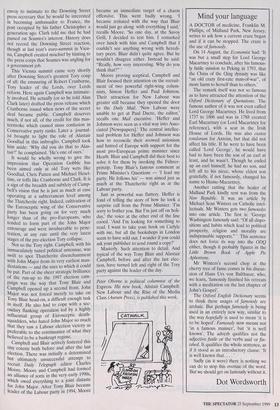Mind your language
A DOCTOR of medicine, Franklin M. Phillips, of Midland Park, New Jersey, writes to ask how a current craze began and if it can be stopped. The craze is the use of famously.
On 14 August, the Economist had: 'It was but a small step for Lord George Macartney to conclude, after his famous- ly futile mission to Peking in 1793, that the China of the Qing dynasty was like "an old crazy first-rate man-of-war", of more harm to herself than to others.'
The remark itself was not so famous as to have attracted the attention of the Oxford Dictionary of Quotations. The famous author of it was not even called Lord George Macartney. He lived from 1737 to 1806 and was in 1788 created Earl Macartney (or Lord Macartney for reference), with a seat in the Irish House of Lords. He was also custos rotulorum for Antrim, but that did not affect his title. If he were to have been called 'Lord George', he would have had to have been the son of an earl at least, and he wasn't. Though he ended up an earl himself, he had no son, and left all to his niece, whose eldest son gratefully, if not famously, changed his name to Hume-Macartney.
Another cutting that the healer of Midland Park kindly sent was from the New Republic. It was an article by Michael Sean Winters on Catholic intel- lectuals. Mr Winters gets two famouslys into one article. The first is: 'George Washington famously said: "Of all dispo- sitions and habits which lead to political prosperity, religion and morality are indispensable supports." ' This sentence does not force its way into the ODQ either, though it probably figures in the Little Brown Book of Apple Pie Aphorisms.
Mr Winters's second chop at the cherry tree of fame comes in his discus- sion of Hans Urs von Balthasar, who, we learn, 'famously finished his retreats with a meditation on the last chapter of John's Gospel'.
The Oxford English Dictionary seems to think these usages of famously are archaic. But perhaps famously is being used in an entirely new way, similar to the way hopefully is used to mean 'it is to be hoped'. Famously now means not `in a famous manner', but it is well known'. The adverb qualifies not the adjective futile or the verbs said or fin- ished. It qualifies the whole sentence, as if it stood as an introductory clause: 'It is well known that. . . . '
Sadly (as it were) there is nothing we can do to stop this overuse of the word. But we should get on famously without it.
Dot Wordsworth


























































































 Previous page
Previous page